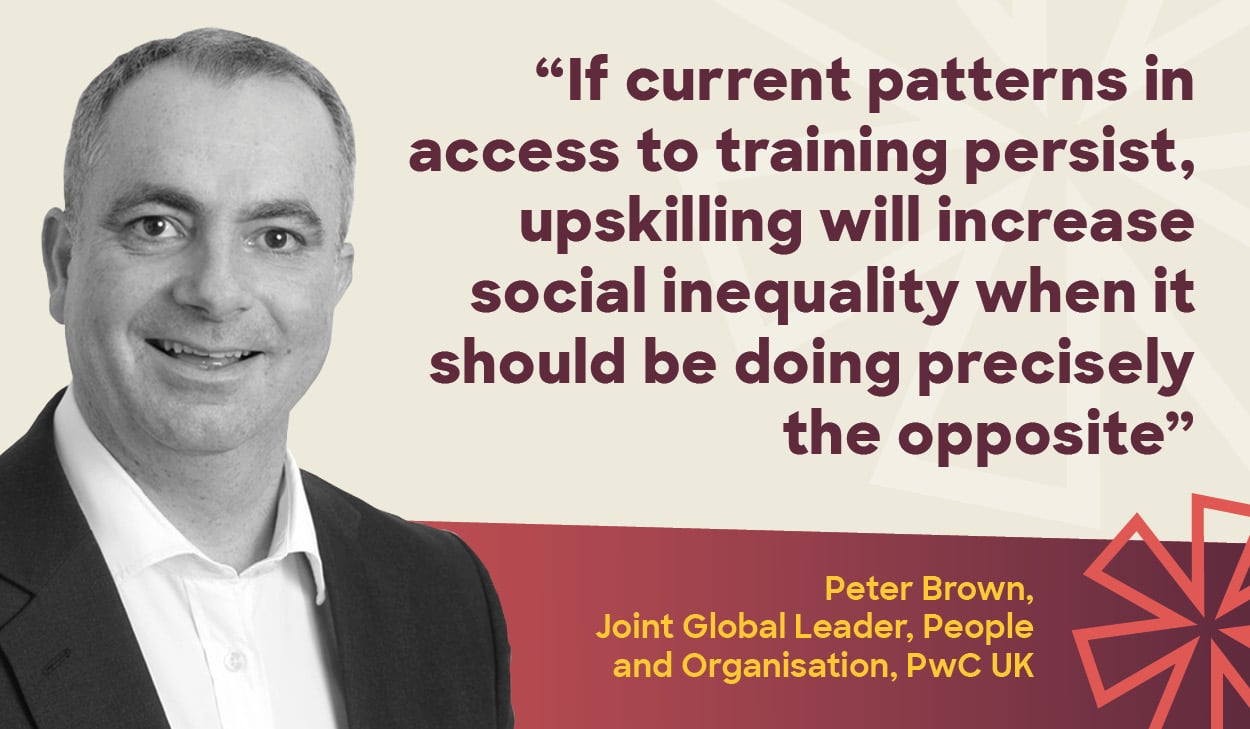Lifelong learning is key to success in the new era of work, writes Peter Brown, Global Leader of People & Organisation at PwC.
The COVID-19 pandemic has inadvertently been one of the biggest catalysts for workplace change in recent years, creating a mass ‘experiment’ in remote working for an incredible number of workers. The scramble to ensure business continuity was a top priority and employees had to quickly adapt to working remotely alongside balancing the demands of caring for family members and pets.
Super-achievers and 'always being on' is propping up productivity
But despite these challenges, data has shown us that productivity has held up during this time. However, we know that many employees are working harder and longer hours than before the pandemic and this level of performance is not sustainable over the long term. Data from PwC’s Perform Plus Platform has suggested that productivity has been propped up by a cohort of super achievers, but not everyone has thrived and many are feeling the pressure. And whether it’s email notifications on your phone, work instant messaging groups or video calls, technology has enabled people to ‘always be on’.
Why taking breaks can help to switch off at the end of the day and prevent burnout
A global study by PwC of over 32,500 workers, found that only 23% of respondents are encouraged to take short breaks throughout the day and even more worryingly only a third are able to disconnect from work outside of working hours. That means that 65% of workers can’t switch off in the evenings, at weekends or on vacation. And that has massive implications for organisations and the risk that their people will burnout.
This is coupled with an ever-present undercurrent of uncertainty around job security and what the future of work may mean for many, due to the rise of AI and automation.
Preparing for the future of work is all about honest communication
PwC’s 2021 Hopes and Fears Survey found that two in five workers think their job will be obsolete within five years. Automation and AI will affect every level of the business and its people. But anxiety kills confidence and how your employees feel affects the business today. Organisations must therefore start a mature, open and honest conversation about the future.
So how can organisations support their people and help them prepare for the future of work?
Companies need to focus on lifelong learning and upskilling existing employees
We can see that employees are open to embracing new technologies, indeed 80% feel confident they can adapt to new technology entering their workplace and 77% are willing to learn a new skill to remain employable. It’s this willingness to upskill and lifelong learning that companies need to capitalise on.
CEOs are worried about the lack of key skills and the pandemic has provided increasing evidence of a growing skills mismatch amongst workers and so it makes sense to invest in upskilling the existing workforce so they can adapt and thrive in a digital world and workplace.
Who has the opportunity to upskill?
But while this makes sense in theory, there are huge disparities between those who have the opportunity to upskill and those who don’t. Nearly half of employees from our survey with postgraduate degrees say their employer gives them many opportunities to improve their digital skills, in comparison to less than a third of those with school-leaver qualifications.
And industries like retail or transport, which are most at risk of disruption, 75% and 80% say they don’t have opportunities to improve their digital skills, which accounts for huge numbers of the working population.
Why the upskilling challenge needs to be tackled by everyone
If current patterns in access to training persist, upskilling will increase social inequality when it should be doing precisely the opposite. The upskilling challenge isn’t just down to business leaders, individuals or governments, it’s about a collective response from all parties to work together to intensify efforts to ensure people in the most at risk industries and groups get the opportunities they need. Automation and technological disruption are inevitable, but we can control whether its negative effects are managed or not.
An opportunity to make proactive rather than reactive change
The way we work is changing at an unprecedented pace. Yet the shifts can provide the catalyst for overcoming the stresses and frustrations of the past, and developing an environment that fosters agility, wellness and innovation.
Leading organisations recognise the value and power of their people and are taking the initiative rather than simply reacting to change. Those companies that don’t act now risk losing prized talent and failing to attract the very people they need to adapt and compete. This is an opportunity not to be missed.
Our online management courses focus on upskilling the talent you already have, find out more by clicking below.

















